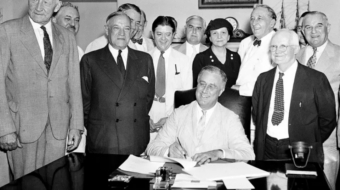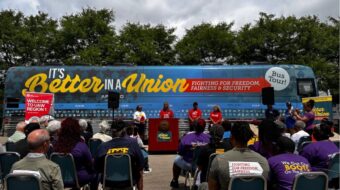WASHINGTON — The nation’s capital played host to over 10,000 elected delegates of the National Education Association’s 87th annual representative assembly July 1-6. Teachers, educational support and administrative personnel were joined by thousands of other allied professionals and trade unionists and guests at what was billed as the world’s largest democratic deliberative body.
The assembly’s festive atmosphere did not diminish the fact that teachers were acutely aware that public schooling and its future is a main item on the nation’s domestic agenda, especially in this presidential election year.
The assembly voted by 79 percent to endorse Democrat Barack Obama for president. NEA President Reg Weaver told the delegates, “Barack Obama has stood with educators throughout his career in public service. It’s time for change. We need a pro-public-education president who will treat children as more than test scores.”
Noting how the basic national education law — No Child Left Behind (NCLB) — has failed, Weaver (the fourth Black person to hold the NEA presidency) told the delegates that “the federal government must move beyond testing, labeling and punishing, and begin partnering with states to close achievement gaps for all students.” Moreover, Weaver said, the federal government must “focus on equity, opportunity and targeted assistance to underserved communities.”
Thousands of delegates wore T-shirts proclaiming that the NCLB law should be erased, re-written and then re-authorized. Several delegates interviewed went further and said the law should be abolished outright and replaced with new legislation more friendly towards urban students, educators and their schools.
In a show of gratitude for NEA’s endorsement, Obama spoke to the assembly by satellite broadcast. He applauded the 3-million-plus-member union for its efforts to advance its “Great Public Schools for Every Student by 2020” program. He noted that the NEA’s program “provides critical starting points for a new educational compact.”
Obama pointed out that his Republican rival John McCain “has been in Washington nearly 30 years. McCain’s got a pretty slim record on education. And when he’s taken a stand it’s the wrong one.” He said that McCain’s tax breaks for the richest Americans are unjust, and that McCain is against allocating money to hire 100,000 new teachers.
NEA has launched a $50 million campaign to elect pro-public-education candidates in the 2008 elections. The aim is to elect a president and Congress friendly to public education and push them to deliver on NEA’s aim for new directions in public schooling.
At times debate grew very heated in the voting on more than 200 resolutions and new business items. On questions of militarism, U.S. imperialism, the threat to attack Iran, immigration reform, reparations for Black American enslavement and the like, the great majority of delegates demonstrated a willingness to listen to the debates and then vote for progressive positions.
Delegates tipped their hats to visiting foreign educators and human rights activists, including leaders from Latin America, Britain, Germany, Morocco and the Philippines. Thulas Nxesi, secretary general of the South African Democratic Teachers Union, told the crowd that his union has benefitted from the leadership and guidance of the NEA since the end of the apartheid era.
Next year the NEA will meet in San Diego. By then George Bush will be gone but his educational legacy — including the problematic No Child Left Behind law — will remain. The big questions are: Will NCLB stay as is or will it be revamped and brought into line with the NEA’s position? Will the foundation for the NEA’s Great Public Schools vision for 2020 be set in motion? If Obama is elected, the NEA hopes that its bet on him will begin to pay off with support for the goals and programs the union holds dear.
Mahdi Ibn-Ziyad is an NEA member who lives in Camden, N.J.










